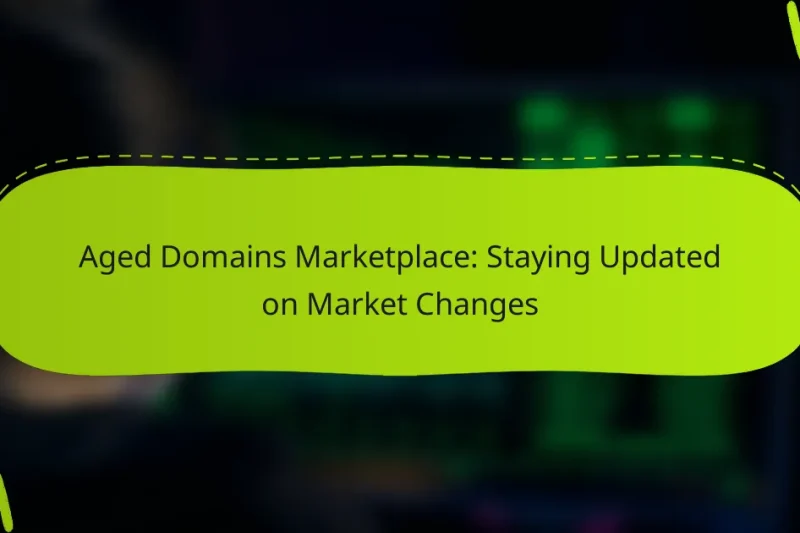Aged domains are valuable assets in the digital landscape, offering benefits such as improved SEO rankings … Aged Domains: Regional Trends and Global ComparisonsRead more
Current Market Trends in Aged Domains
The market for aged domains is currently experiencing significant changes, particularly due to their recognized SEO benefits and growing interest from marketers. As businesses increasingly value established domains for their credibility and authority, demand is surging, resulting in higher prices and a more competitive environment. Understanding the history and backlink profile of these domains is crucial for making informed investment decisions.
Aged Domain Valuation: Impact of Technology Advancements
In the rapidly evolving digital landscape, technology advancements play a crucial role in the valuation of … Aged Domain Valuation: Impact of Technology AdvancementsRead more
Aged Domain Prices: Economic Factors and Market Influence
Aged domain prices are shaped by various economic factors, including domain authority, market demand, and historical … Aged Domain Prices: Economic Factors and Market InfluenceRead more
Aged Domains Marketplace: Current Trends and Insights
The aged domains marketplace is experiencing significant growth as more investors and businesses recognize the advantages … Aged Domains Marketplace: Current Trends and InsightsRead more
Aged Domains Marketplace: Staying Updated on Market Changes
The aged domains marketplace is evolving rapidly, making it essential for buyers to stay informed about … Aged Domains Marketplace: Staying Updated on Market ChangesRead more
Aged Domains Market: Future Predictions and Growth Opportunities
The Aged Domains Market is poised for significant growth as businesses increasingly seek established online presences … Aged Domains Market: Future Predictions and Growth OpportunitiesRead more
Aged Domains: Demand Across Industries and Sectors
Aged domains have become increasingly sought after across various industries due to their established credibility and … Aged Domains: Demand Across Industries and SectorsRead more
What are the current trends in aged domains in Palau?
In Palau, the market for aged domains is experiencing notable shifts, primarily driven by their perceived SEO advantages and increasing interest from marketers. As businesses recognize the value of established domains, demand is rising, leading to higher prices and a more competitive landscape.
Increased demand for SEO benefits
Aged domains are sought after for their potential SEO benefits, including better search engine rankings and established backlinks. Businesses in Palau are increasingly aware that a domain with a history can enhance their online visibility and credibility.
To maximize these benefits, companies should look for domains with a clean history and relevant backlinks. Conducting thorough due diligence on the domain’s past can help avoid penalties from search engines.
Higher prices for premium domains
The prices of premium aged domains in Palau have risen significantly due to heightened demand. Domains that are short, memorable, or contain popular keywords can command prices in the high hundreds to thousands of USD.
When considering a purchase, it’s essential to evaluate the domain’s potential return on investment. Compare similar domains and their selling prices to gauge market value and avoid overpaying.
Growing interest from digital marketers
Digital marketers in Palau are increasingly investing in aged domains as part of their strategies. This interest stems from the understanding that these domains can provide a competitive edge in online marketing campaigns.
Marketers should focus on domains that align with their brand and target audience. Networking with domain brokers and attending local digital marketing events can help identify valuable opportunities in the aged domain market.
How do aged domains impact SEO performance?
Aged domains can significantly enhance SEO performance by providing established credibility and authority in search engine rankings. Their history often includes accumulated backlinks and organic traffic, which can lead to quicker visibility and improved rankings.
Improved domain authority
Aged domains typically have higher domain authority due to their longer presence on the internet. This authority is a crucial factor in search engine algorithms, influencing how well a site ranks for relevant keywords. When acquiring an aged domain, check its domain authority score using tools like Moz or Ahrefs to ensure it meets your needs.
Additionally, a higher domain authority can lead to better trust from users and search engines alike, making it easier to attract organic traffic. Aim for domains with a score in the upper range, ideally above 30, to maximize benefits.
Faster indexing by search engines
Search engines tend to index aged domains more quickly than new ones because they have established a history of content and activity. This can lead to faster visibility in search results, which is particularly beneficial for new projects or businesses looking to gain traction. A well-maintained aged domain can be indexed within days, compared to weeks for newer domains.
To leverage this advantage, ensure the domain has a clean history with no penalties or spammy backlinks. Regularly updating content can also encourage search engines to crawl the site more frequently.
Enhanced backlink profiles
Aged domains often come with existing backlinks, which can significantly boost their SEO value. These backlinks may originate from reputable sites, providing a strong foundation for your SEO strategy. When evaluating an aged domain, analyze its backlink profile using tools like SEMrush or Majestic to identify quality links and potential toxic ones.
Utilizing an aged domain with a robust backlink profile can save time and effort in link-building campaigns. However, be cautious of domains with a history of spammy links, as these can harm your SEO efforts. Aim for domains with a diverse and relevant backlink portfolio to maximize your chances of success.
What are the best practices for acquiring aged domains?
Acquiring aged domains requires careful consideration of several key factors to ensure a successful investment. Focus on the domain’s history, backlink profile, and any potential penalties to make informed decisions.
Research domain history
Understanding the history of an aged domain is crucial. Look for information on previous ownership, the purpose of the site, and any changes in content over time. Tools like the Wayback Machine can help you view past versions of the site.
Check for any significant changes in traffic patterns or content that may indicate issues. A domain with a stable history is generally more valuable than one with a turbulent past.
Evaluate backlink quality
The quality of backlinks pointing to an aged domain significantly impacts its SEO value. Use tools like Ahrefs or Moz to analyze the backlink profile, focusing on the authority and relevance of the linking sites.
Aim for a diverse backlink profile with links from reputable sources. Avoid domains with spammy or low-quality backlinks, as these can harm your own site’s reputation and rankings.
Check for penalties
Before acquiring an aged domain, ensure it has not been penalized by search engines. Use Google Search Console or similar tools to check for manual actions or algorithmic penalties that could affect visibility.
Domains with penalties may require extensive recovery efforts, which can be costly and time-consuming. Always prioritize domains with a clean slate to maximize your investment’s potential.
What are the risks associated with aged domains?
Aged domains can offer advantages, but they also come with significant risks that potential buyers should consider. Key concerns include the potential for spammy backlinks, the risk of previous penalties from search engines, and the possibility of brand confusion.
Potential for spammy backlinks
Aged domains may have accumulated backlinks over time, some of which could be from low-quality or spammy sites. These backlinks can negatively impact the domain’s search engine ranking and overall reputation. It’s essential to conduct a thorough backlink audit before purchasing an aged domain to identify any harmful links.
To mitigate this risk, use tools like Ahrefs or Moz to analyze the backlink profile. If a significant portion of the backlinks is from dubious sources, it may be wise to avoid that domain or invest in a cleanup strategy.
Risk of previous penalties
Domains can be penalized by search engines for various reasons, including violations of guidelines or association with spammy practices. If an aged domain has a history of penalties, it may be challenging to recover its ranking and visibility. Checking the domain’s history through tools like Google Search Console can reveal any past issues.
When considering an aged domain, look for signs of previous penalties, such as sudden drops in traffic or ranking. If penalties are present, be prepared for a potentially lengthy recovery process.
Possibility of brand confusion
Aged domains may have names similar to existing brands or businesses, leading to potential brand confusion. This can create legal issues or dilute brand identity if customers mistakenly associate the new domain with an established entity. Conducting a trademark search is crucial to avoid these complications.
To minimize brand confusion, choose a domain name that is distinct and does not closely resemble existing brands. This proactive approach can help establish a clear identity and reduce the risk of legal disputes.
How to assess the value of an aged domain?
To assess the value of an aged domain, consider its historical traffic, keyword rankings, and overall market demand. These factors will help you determine its potential for generating revenue and improving search engine visibility.
Analyze traffic metrics
Start by examining the traffic metrics of the aged domain. Look for data on unique visitors, page views, and bounce rates over time. Tools like Google Analytics or SEMrush can provide insights into these metrics.
High and consistent traffic levels indicate a valuable domain, while declining or erratic traffic may signal issues. Aim for domains with traffic in the low thousands of visits per month for a solid investment.
Evaluate keyword rankings
Keyword rankings are crucial in determining an aged domain’s value. Check which keywords the domain ranks for and their positions in search engine results. Tools such as Ahrefs or Moz can help you analyze this data.
Focus on keywords with high search volume and low competition, as they can drive significant organic traffic. A domain ranking for several relevant keywords in the top 10 can be particularly valuable.
Consider market demand
Market demand plays a vital role in the value of an aged domain. Research the niche or industry associated with the domain to gauge its popularity and growth potential. Use tools like Google Trends to assess interest over time.
Domains in high-demand sectors, such as technology or health, typically command higher prices. Conversely, domains in declining industries may not hold the same value. Always consider the current market landscape before making a purchase decision.
What are the key factors influencing aged domain pricing?
Aged domain pricing is primarily influenced by factors such as domain age, historical performance, and market demand. Understanding these elements can help buyers make informed decisions when investing in aged domains.
Domain age and history
The age of a domain is a significant factor in its valuation, as older domains often carry more authority and trust with search engines. A domain that has been registered for several years may have established backlinks and a history of traffic, which can enhance its desirability.
When evaluating a domain’s history, consider its previous use and any penalties it may have incurred. Domains that were previously associated with spammy content or have been penalized by search engines may be less valuable, even if they are old.
Potential buyers should conduct thorough research on the domain’s past, including checking for any existing penalties or negative associations. Tools like the Wayback Machine can help visualize a domain’s history, while SEO analysis tools can provide insights into its backlink profile.






